| Grand Trunk Agreement
Signed
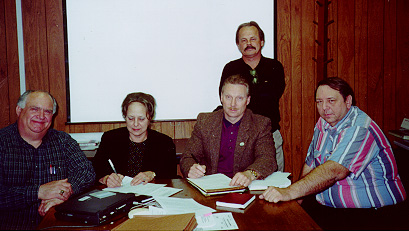
On April 18, 2001, the agreement ratified by 90% of BMWE members
employed on the Grand Trunk Rail System was signed. This agreement
resolved the bargaining demands contained in Section 6 notices served
prior to January 1, 1999 and provides for a 3% annual wage increase
each January from 2000 to 2004. Shown seated left to right, Robert
Cerri, Grand Trunk Superintendent; M. Kovacs, Grand Trunk Labor
Relations Manager; Perry Geller, General Chairman, BMWE Consolidated
Rail System Federation; Paul Beard, General Chairman, BMWE Nickel
Plate-Wheeling & Lake Erie Federation. Standing is Richard McLean,
Assistant General Chairman, BMWE Consolidated Rail System Federation.
Bush’s First 100 Days
After 100 days in the White House, President Bush "has
proposed and implemented policies that reward his big corporation and
wealthy campaign contributors at the expense of children and working
families," said Linda Chavez-Thompson, AFL-CIO Executive Vice
President, at a Capitol Hill press conference on April 25. She and
other speakers compared Bush’s campaign promises with his actions
and found a wide gap. They slammed Bush’s millionaire tax cut (then
a proposal) that raided the Medicare trust fund, his signature on
legislation killing the workplace ergonomics standard, his support of
letting states duck minimum wage requirements, his support of
corporate polluters and opposition to a Medicare prescription drug
benefit for all seniors. If Bush "continues to attack working
families in order to serve big corporate interests and the wealthy, as
he has in his first 100 days, he will seal his standing as the worst
president for working people in 70 years," said AFL-CIO President
John Sweeney.
Workers Memorial Day — April 28, 2001
More than 6,000 workers died on the job in 1999, another 50,000
died from occupational diseases and another 5.7 million were hurt on
the job. Those workers and others killed and injured were honored
during more than 100 Workers Memorial Day ceremonies around the nation
this year. The latest figures on workplace deaths and injuries are
contained in the 10th edition of "Death on the Job:
The Toll of Neglect," prepared by the AFL-CIO’s Safety and
Health Department. The 1999 figures are the latest available.
Construction work is the most dangerous major industry in the nation,
and in a dozen cities, members of construction unions demonstrated in
front of construction temporary employment agencies, which have some
of the worst safety records in the industry.
"The best way to honor our fallen brothers and sisters is to
redouble our fight to protect current and future workers on the job.
Safety in the workplace is a right and we must continue to fight until
every last worker returns home safely at the end of the day,"
said Sonny Hall, President of the AFL-CIO Transportation Trades
Department. "While Workers Memorial Day coincides with the 30th
anniversary of the creation of the Occupational Safety and Health
Administration (OSHA), the progress we have made over the last three
decades is in grave danger. It was a sad day when, at the behest of
special interests, President George W. Bush and Congress killed new
OSHA regulations which would have protected millions of workers from
crippling repetitive strain injuries such as carpal tunnel syndrome.
More than 600,000 American workers — many of them in transportation
— suffer some form of ergonomic injury each year. But Congress and
the White House turned back the clock on job safety. The men and women
in transportation work in some of the nation’s most dangerous
occupations. We honor their dedication and professionalism in making
our transportation system the world’s finest. But we must not rest
in our fight for health and safety until the terrible scourge of
workplace injury and death has ended."
BMWE Members Attend Jeff-Jack Dinner
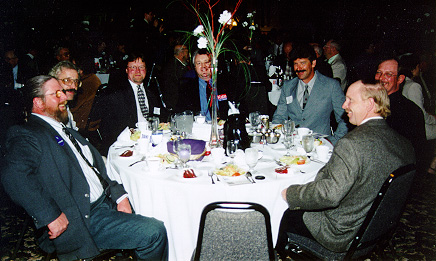
On May 5, 2001, members of the BMWE — including Leon Fenhaus,
General Chairman of the Chicago & North Western System Division
and Joseph Kraljic, State Legislative Director — attended the South
Dakota Democratic Party annual Jefferson-Jackson Day celebration. The
keynote speaker was former U.S. Senator and presidential candidate
George McGovern. Other speakers included Senators Tim Johnson (SD) and
Byron Dorgran (ND) and Gil Koetzle, President of the South Dakota
AFL-CIO and a state senator. (Photo by BMWE member Jim Goetz.)
Alliance for Retired Americans is Launched
The Alliance for Retired Americans, established in January this
year by the AFL-CIO, was officially launched on May 23, when seniors
gathered and spoke out in more than 20 cities to support a Medicare
prescription drug program.
The Alliance is a nationwide organization of more than 2-1/2
million union retirees dedicated to the achievement of social and
economic justice and full civil rights for all citizens. Its members
believe that older and retired persons have a responsibility to strive
to create a society which incorporates these goals.
Its Mission Statement says "a primary objective is to enroll
and mobilize retired union members and other senior and community
activists into a nationwide grassroots movement advocating a
progressive political and social agenda — one that respects work and
strengthens families. The long-term goal of the Alliance is to become
a leading voice for older Americans. By engaging in important
political battles to protect and preserve programs vital to the health
and economic security of older Americans, the Alliance will gain
recognition as the country’s leading progressive grassroots senior
organization."
After the launch, one reporter wrote that the union clearly sees
the Alliance "as a smaller but more muscular counterpart to the
AARP, eager to fight Bush administration policies on Medicare and
Social Security." He also noted that "older Americans will
make up an increasing percentage of voters in coming decades, from a
third to as much as 40 percent in some models."
The Alliance says that "Americans are living longer today than
ever before. On average, women will live until 84 and men until 80.8
(1997 figures). Living longer can be a wonderful thing, if one has
good health and is able to maintain a decent quality of life. The
Alliance is committed to do all it can to make sure that is the case
for all of its members."
Members of the former National Council of Senior Citizens, which
ceased operations in 2000, are charter members of the Alliance. The
Alliance will build on the successes and strengths of the NCSC,
created 40 years ago, which led the campaign to establish Medicare and
fought to strengthen Social Security.
The Alliance is an inclusive organization that welcomes all
seniors. Seniors who are not union retirees or members of the former
NCSC, can join the Alliance for just $10 a year. Membership
information is available online at www.retiredamericans.org.
BMWE Members Honored with Alfred McKenzie Award
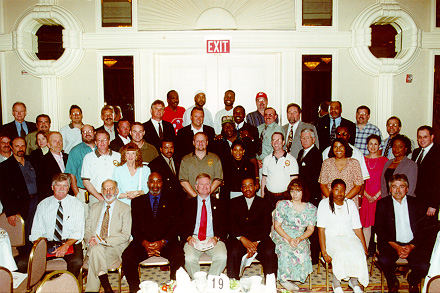
Over 700 civil rights activists, including 40 plus from the BMWE
(shown in photo), attended the Washington Lawyers’ Committee for
Civil Rights and Urban Affairs annual Wiley A. Branton Awards Luncheon
on June 6 at the Capital Hilton Hotel in Washington, DC.
Since 1989, the Committee’s annual luncheon has been named in
honor of Wiley A. Branton, Sr., whose "work as a civil rights
lawyer practicing in Arkansas in the 1950s, was lonely, dangerous and
heroic." The Branton Award is annually bestowed upon a member of
the legal community whose lifetime efforts on behalf of civil rights
advocacy exemplify the deep commitment of Wiley A. Branton, Sr.
In 1994, the Alfred McKenzie Award was established to recognize
Committee clients whose dedication and courage have produced civil
rights victories of particular significance. It takes its name from a
man whose efforts as a Committee plaintiff helped to change an
institution.
During World War II, Alfred McKenzie left his entry-level position
in the Government Printing Office to join the Army Air Corps where he
served with distinction as one of the famed Tuskegee Airmen. When he
returned to the GPO in 1946, he was assigned to the same low-level
position he had held before his military service. He then began a
career-long struggle to win equal treatment for himself and his fellow
African-American GPO employees.
In 1972, represented by Committee staff and the firm of Hogan &
Hartson, Mr. McKenzie initiated a class action lawsuit to challenge
racial discrimination against African-American pressmen at the GPO.
Fifteen years later, his determination led to a landmark victory that
secured a record $2.4 million payment to hundreds of African-American
workers and, even more important, a fundamental restructuring of
personnel policies that opened the door of equal opportunity to
countless minority workers.
In the program for the award luncheon, the Committee stated the
2001 Alfred McKenzie awardees were "most worthy recipients"
because "their courageous and skilled leadership call to mind the
efforts of Alfred McKenzie in challenging the discriminatory policies
of the Government Printing Office."
The two union leaders who share this year’s McKenzie Award
"for their courageous leadership leading to landmark litigation
that successfully challenged racial discrimination in the nation’s
largest railroad" are Anthony Rochon and Jed Dodd, Vice Chairman
and General Chairman, respectively, of the BMWE Pennsylvania
Federation.
"Following complaints generated through the Union, the
Washington Lawyers’ Committee in 1999 brought a class action lawsuit
on behalf of blue-collar maintenance of way employees working on
Amtrak’s northeast corridor. [Sprenger & Lang served as chief
counsel for the plaintiffs.] The Federation joined numerous individual
workers in alleging a pattern of racially discriminatory conduct in
hiring, promotions and disciplinary decisions affecting thousands of
African-American workers. The settlement reached in April of last year
provided $16 million in monetary relief for class members and
wide-ranging reforms of the company’s personnel practices.
"The attention generated by this case led directly to two
other major lawsuits challenging racial discrimination in other parts
of Amtrak. The first of these, involving management employees, was
settled on highly favorable terms; the second, involving a range of
issues throughout the country, is pending before the District Court.
In a very real sense, both of these cases have their origins in the
efforts so well begun by Mr. Rochon, Mr. Dodd and their union."
BMWE Members Help as Lawmakers Renew Push for Gene
Discrimination Bill
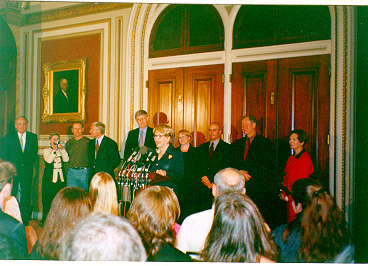
At podium, U.S. Rep. Louise Slaughter. Behind
her, left to right, Senator Tom Harkin, Deb Escher, David Escher, Russ
Ingebritson, Dr. Collins, Janice Avary, Gary Avary, BMWE Director of
Government Affairs Jim Knight and U.S. Rep. Constance Morella.
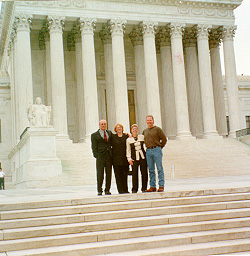
On Capitol Hill, from left to right, Gary &
Janice Avary and Deb & Dave Escher.
Indicating its importance, on their first full day in charge of the
Senate, Democratic leaders vowed early action on legislation to bar
discrimination based on genetic information. And their doing it with
the help and experiences of BMWE members Gary Avary and David Escher.
"We are through waiting," said new Senate Majority Leader
Tom Daschle (D-SD), the lead sponsor of the "Genetic
Discrimination in Health and Employment Act" in the Senate (S
318). Daschle first introduced the bill more than two years ago and
reintroduced it in January as one of the Senate Democrats’ top
priorities. "It’s time for our laws to catch up with our
science. We can’t take one step forward in science but two steps
back in civil rights," he said at a June 7 press conference.
The bill, sponsored in the House (HR 602) by Rep. Louise Slaughter
(D-NY) would bar employees from discriminating in hiring or terms of
employment based on genetic information and bars health insurers from
denying coverage on genetic grounds. The bill also makes it illegal to
disclose genetic information to third parties.
"We all have bad genes, each of us, between 5 and 30,"
said Slaughter, a former microbiologist. "The fact is, if we go
on the way we are, none of us are insurable, none of us are
employable."
Although Congresswoman Slaughter has sponsored similar legislation
for six years and her bipartisan bill has the support of 244
co-sponsors in the House and more than 200 organizations, the measure
has been blocked in subcommittee.
In addition to Daschle and Slaughter, featured speakers at the June
7 press conference included Senators Edward Kennedy (D-MA), Tom Harkin
(D-IA), Christopher Dodd (D-CT), U.S. Rep. Connie Morella (R-MD), Dr.
Francis Collins, director of the National Human Genome Research
Institute and "the man who arguably knows more than anyone in the
world about the genetics revolution" Daschle said, and David
Escher, a BNSF employee and 26-year member of the BMWE.
Collins, who has been arguing for genetic anti-discrimination
legislation for at least four years, spoke eloquently about the great
need for genetic research to combat diseases such as cancer and heart
problems along with the huge ethical problem involved in trying to get
people to be tested for research purposes. "In survey after
survey that’s been carried out in the last couple of years, an
overswhelming majority of respondents say they wouldn’t take a
genetic test for a disease if they thought the information would be
given to their health insurers or their employers," Collins said.
"And yet we do not have at the present time the assurance to give
to these people that such things could not happen."
Escher also spoke eloquently about being genetically tested without
his knowledge by the BNSF and the feelings of anger, depression and
fear this caused when he discovered what had been done. "I felt
totally violated and devalued as a person. I had just been used as a
laboratory rat in a carefully devised scheme where my employer would
benefit greatly. By trying to prove that carpal tunnel syndrome was a
‘genetic disorder’ rather than a work environment related
condition, they could relieve themselves of the financial obligations
to their employees who suffer work related injuries within the
workplace."
As reported in an in-depth article in the April 2001 BMWE JOURNAL,
Escher and Gary Avary as well as about 20 others were required by
Burlington Northern Santa Fe to undergo blood tests after being
diagnosed with carpal tunnel syndrome, a painful condition caused by
the swelling and scarring of the "tunnel" in the wrist that
carries the nerves to the hand. After Avary’s wife Janice
"asked the right questions about a medical exam the railroad
demanded of her husband Gary," reported the Los Angeles Times,
"the Avarys became Exhibit A in a legal battle that could shape
the way the nation regulates genetic testing and the use of the
results." On February 12, the BNSF agreed to halt its coercive
employee genetic testing program — conceding to unprecedented
lawsuits filed by the BMWE and the Equal Opportunity Commission.
The flood of media attention caused by the case helped spur the
reintroducion of the genetic discrimination bills which were defeated
in the previous Congressional session in part because opponents argued
it wasn’t happening. "Genetic testing is a real and frightening
problem and it is happening right now," Kennedy said when he
reintroduced the bill the week of February 19, "And the testing
was being conducted by one of the largest railroads in the
country."
On July 24 Gary Avary testified before the House Committee on
Education & the Workforce, Subcommittee on Employer-Employee
Relations and on July 25 Dave Escher testified before the Senate
Committee on Health, Education, Labor & Pensions, newly chaired by
Senator Kennedy, in support of the pending genetic nondiscrimination
bills.
It is hoped that an article dealing with the personal experiences
of the Avarys and the Eschers over the last year will be featured in a
future issue of the BMWE JOURNAL.
STB Sets New Rail Merger Rules
Six states have no Class 1 railroads: Alaska, Hawaii, Maine, New
Hampshire, Rhode Island and Vermont — From the AAR’s June 28
Train-It
On June 11, the Surface Transportation Board issued its final rules
establishing new merger procedures that govern transactions between
Class 1 carriers. This 381-page document ends a process which began in
March 2000 when the STB issued a blanket 15-month moratorium on
mergers between Class 1 carriers. The moratorium was occasioned by and
scuttled a proposal to combine Burlington Northern Santa Fe and
Canadian National Railway to create North America’s largest rail
system.
The BMWE participated in the Rule Making process with the two key
areas of concern being employee protection and safety.
In a circular letter to all Grand Lodge officers and general
chairmen which provided a brief synopsis of the new procedures,
President Mac A. Fleming noted that "the STB’s new rules
acknowledge the railroad industry has changed dramatically since the
passage of the Staggers Act in 1980 and the round of industry
consolidations that occurred in the 1990s."
The STB document stated that "these new rules reflect our
concerns about what an appropriate rail merger policy should be in
light of the declining number of Class 1 railroads, the elimination of
the industry’s excess capacity and the serious transitional service
problems that have accompanied recent major rail consolidations."
The new rule regarding employee protection reads in part: "The
Board is required to provide a fair arrangement for the protection of
the rail employees of applicants who are affected by a consolidation.
The Board supports early notice and consultation between management
and the various unions, leading to negotiated implementing agreements,
which the Board strongly favors. Otherwise, the Board respects the
sanctity of collective bargaining agreements and will look with
extreme disfavor on overrides of collective bargaining agreements
..."
This provision is not as significant as it would otherwise be
because of the success of the BMWE and most of the other rail unions
in reaching an agreement on March 21 this year with the Class 1
carriers (except for Canadian National) that ends the forced
"cram down" of collective bargaining agreements.
The agreement covers maintenance of way employees on BNSF, CSX,
Kansas City Southern, Norfolk Southern and Union Pacific. The parties
agreed to replace the existing process with one that allows the
involved employees to pick the agreement that will apply in a
consolidation or coordination. The carriers also agreed that under no
circumstances will a New York Dock transaction be used to
create a single system-wide collective bargaining agreement or impose
system gangs not otherwise permitted under existing agreements.
In the new rules, the STB also addressed the issue raised by BMWE
and rail labor regarding the relocation of employees as the result of
a merger. Rail labor argued that any future mergers would be
transcontinental and any requirement in the New York Dock
conditions that an employee must relocate a great distance to remain
eligible for protective benefits was unfair. The STB did not accept or
reject Rail Labor’s arguments, but said, in part: "we
appreciate [rail labor’s] concerns and can foresee the broader
potential for dislocation and hardship for rail employees as a result
of a transcontinental merger. While, at this time, we believe that
this and similar matters should continue to be negotiated between the
railroads and the various labor organizations ..."
Relative to employee safety, the new rules say in part,
"applicants will be required to work with the Federal Railroad
Administration, on a case-by-case basis, to formulate Safety
Integration Plans (SIPs) to ensure that safe operations are maintained
throughout the merger implementation process." |

